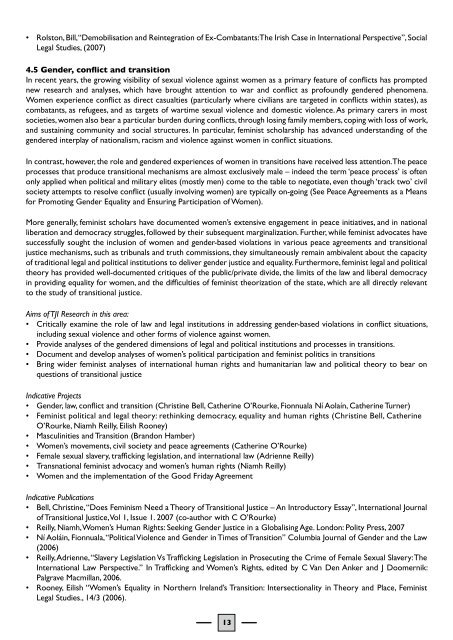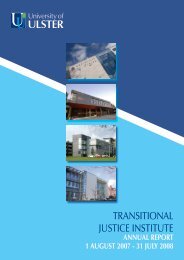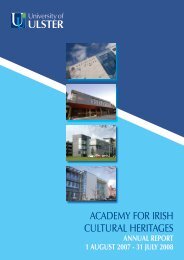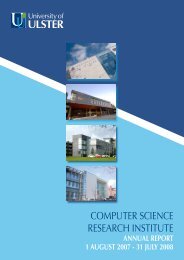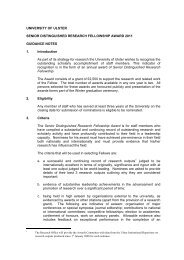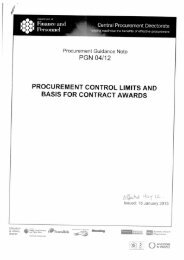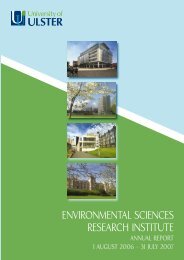transitional justice research institute - University of Ulster
transitional justice research institute - University of Ulster
transitional justice research institute - University of Ulster
Create successful ePaper yourself
Turn your PDF publications into a flip-book with our unique Google optimized e-Paper software.
• Rolston, Bill, “Demobilisation and Reintegration <strong>of</strong> Ex-Combatants: The Irish Case in International Perspective”, Social<br />
Legal Studies, (2007)<br />
4.5 Gender, conflict and transition<br />
In recent years, the growing visibility <strong>of</strong> sexual violence against women as a primary feature <strong>of</strong> conflicts has prompted<br />
new <strong>research</strong> and analyses, which have brought attention to war and conflict as pr<strong>of</strong>oundly gendered phenomena.<br />
Women experience conflict as direct casualties (particularly where civilians are targeted in conflicts within states), as<br />
combatants, as refugees, and as targets <strong>of</strong> wartime sexual violence and domestic violence. As primary carers in most<br />
societies, women also bear a particular burden during conflicts, through losing family members, coping with loss <strong>of</strong> work,<br />
and sustaining community and social structures. In particular, feminist scholarship has advanced understanding <strong>of</strong> the<br />
gendered interplay <strong>of</strong> nationalism, racism and violence against women in conflict situations.<br />
In contrast, however, the role and gendered experiences <strong>of</strong> women in transitions have received less attention. The peace<br />
processes that produce <strong>transitional</strong> mechanisms are almost exclusively male – indeed the term ‘peace process’ is <strong>of</strong>ten<br />
only applied when political and military elites (mostly men) come to the table to negotiate, even though ‘track two’ civil<br />
society attempts to resolve conflict (usually involving women) are typically on-going (See Peace Agreements as a Means<br />
for Promoting Gender Equality and Ensuring Participation <strong>of</strong> Women).<br />
More generally, feminist scholars have documented women’s extensive engagement in peace initiatives, and in national<br />
liberation and democracy struggles, followed by their subsequent marginalization. Further, while feminist advocates have<br />
successfully sought the inclusion <strong>of</strong> women and gender-based violations in various peace agreements and <strong>transitional</strong><br />
<strong>justice</strong> mechanisms, such as tribunals and truth commissions, they simultaneously remain ambivalent about the capacity<br />
<strong>of</strong> traditional legal and political institutions to deliver gender <strong>justice</strong> and equality. Furthermore, feminist legal and political<br />
theory has provided well-documented critiques <strong>of</strong> the public/private divide, the limits <strong>of</strong> the law and liberal democracy<br />
in providing equality for women, and the difficulties <strong>of</strong> feminist theorization <strong>of</strong> the state, which are all directly relevant<br />
to the study <strong>of</strong> <strong>transitional</strong> <strong>justice</strong>.<br />
Aims <strong>of</strong> TJI Research in this area:<br />
• Critically examine the role <strong>of</strong> law and legal institutions in addressing gender-based violations in conflict situations,<br />
including sexual violence and other forms <strong>of</strong> violence against women.<br />
• Provide analyses <strong>of</strong> the gendered dimensions <strong>of</strong> legal and political institutions and processes in transitions.<br />
• Document and develop analyses <strong>of</strong> women’s political participation and feminist politics in transitions<br />
• Bring wider feminist analyses <strong>of</strong> international human rights and humanitarian law and political theory to bear on<br />
questions <strong>of</strong> <strong>transitional</strong> <strong>justice</strong><br />
Indicative Projects<br />
• Gender, law, conflict and transition (Christine Bell, Catherine O’Rourke, Fionnuala Ní Aolaín, Catherine Turner)<br />
• Feminist political and legal theory: rethinking democracy, equality and human rights (Christine Bell, Catherine<br />
O’Rourke, Niamh Reilly, Eilish Rooney)<br />
• Masculinities and Transition (Brandon Hamber)<br />
• Women’s movements, civil society and peace agreements (Catherine O’Rourke)<br />
• Female sexual slavery, trafficking legislation, and international law (Adrienne Reilly)<br />
• Transnational feminist advocacy and women’s human rights (Niamh Reilly)<br />
• Women and the implementation <strong>of</strong> the Good Friday Agreement<br />
Indicative Publications<br />
• Bell, Christine, “Does Feminism Need a Theory <strong>of</strong> Transitional Justice – An Introductory Essay”, International Journal<br />
<strong>of</strong> Transitional Justice, Vol 1, Issue 1. 2007 (co-author with C O’Rourke)<br />
• Reilly, Niamh, Women’s Human Rights: Seeking Gender Justice in a Globalising Age. London: Polity Press, 2007<br />
• Ní Aoláin, Fionnuala, “Political Violence and Gender in Times <strong>of</strong> Transition” Columbia Journal <strong>of</strong> Gender and the Law<br />
(2006)<br />
• Reilly, Adrienne, “Slavery Legislation Vs Trafficking Legislation in Prosecuting the Crime <strong>of</strong> Female Sexual Slavery: The<br />
International Law Perspective.” In Trafficking and Women’s Rights, edited by C Van Den Anker and J Doomernik:<br />
Palgrave Macmillan, 2006.<br />
• Rooney, Eilish “Women’s Equality in Northern Ireland’s Transition: Intersectionality in Theory and Place, Feminist<br />
Legal Studies., 14/3 (2006).<br />
13


